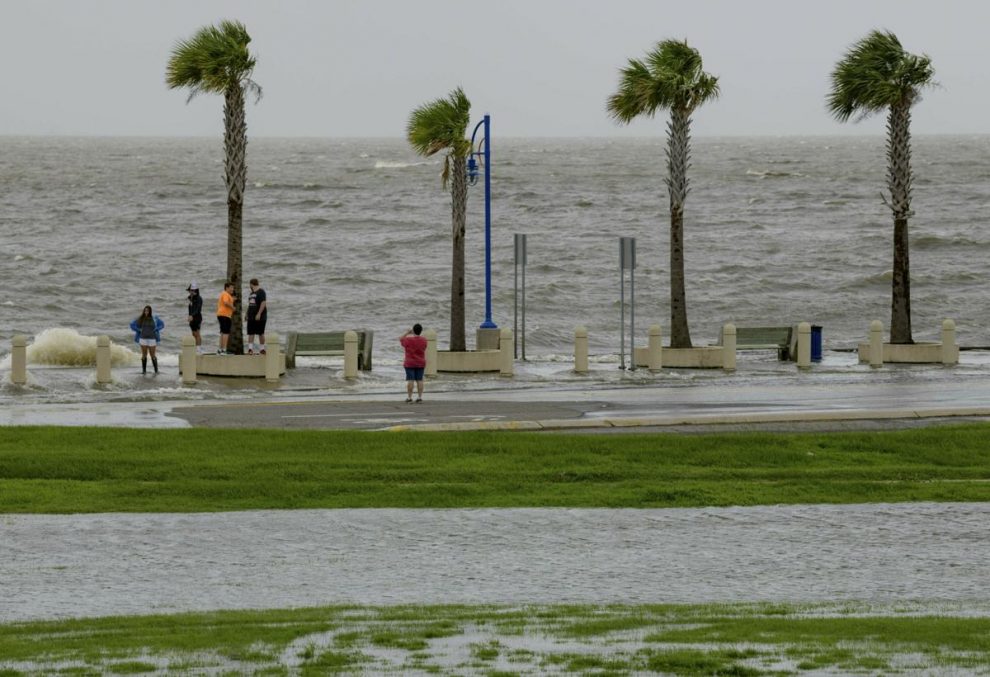Hurricane Barry could affect the environment of the Gulf coast and Lower Mississippi Valley in numerous ways, from accelerating runoff of farmland nutrients to toppling trees and damaging wildlife habitat and fisheries, scientists say.
But the extent of the damage — and whether it will be at least partially offset by benefits such as disruption of the notorious Gulf of Mexico “dead zone” — is hard to predict, they say. That’s because the region faces a rare one-two-three punch : the storm’s anticipated tidal surge and torrential downpour, combined with record-high water levels in the Mississippi River.
“We don’t know how the system is going to respond to all this because it’s so unusual,” said Melissa Baustian, a coastal ecologist with the Water Institute of the Gulf in Baton Rouge, Louisiana.
One of the wettest-ever springs in the nation’s heartland engorged the Mississippi, sending massive volumes of water southward toward the Gulf. Levees and dams were breached and millions of acres of cropland flooded in the Midwest. Barry threatens to hurl a storm surge of up to 3 feet (1 meter) onto coastal regions. And forecasters said the hurricane could stall inland and dump up to 2 feet (61 centimeters) of rain.
Rainfall washes manure and chemical fertilizers from Midwestern corn and soybean fields into streams, smaller rivers and eventually the Mississippi. The nutrients — especially nitrogen — overfeed aquatic plants that eventually die and decompose, leaving a large section of the Gulf with little or no oxygen each summer. The National Oceanic and Atmospheric Administration predicted that this year’s dead zone will be roughly the size of Massachusetts.
Large storms can shrink the zone by churning the water column and replenishing oxygen levels in deeper areas. That could be a positive, if short-lived, outcome of Barry’s rampage, Baustian said.
Yet even if this year’s oxygen-depleted area winds up smaller than expected, historical data suggests that Barry — like other big storms — will flush additional nutrients into the Mississippi and other Gulf tributaries, leading to bigger dead zones in the long run, said Anna Michalak of the Carnegie Institution for Science in Stanford, California.
“If you get a few sprinkles over time, the water has time to infiltrate and there’s not much runoff,” said Michalak, who studies effects of climate change on water quality. “But a single extreme event overwhelms the capacity of the soil and the ecosystem to absorb it, and much of it ends up flowing down the rivers and ultimately off to the coast.”
Even if Barry’s winds remain barely powerful enough for the storm to qualify as a hurricane, they could topple lots of trees, their roots weakened by the saturated ground, said Tim Carruthers, coastal ecology director with the Water Institute. Also vulnerable are Louisiana’s famed coastal marshes, already hammered by development and flood control measures that prevent natural coastal shoreline replenishment.
Scientists also will keep watch for stranded dolphins. About 290 have been found along the Gulf coast since Feb. 1 — triple the usual number — and nearly all have died.
It’s unclear why, although one possibility is exposure to fresh water coursing into the Gulf from flooding rivers and a Louisiana spillway that diverts overflow from the Mississippi, said Teri Rowles, head of a NOAA program on stranded marine mammals.
The spillway, built in 1938 to provide a safety valve during flooding, has been open for a record number of days this year, said David Muth of the National Wildlife Federation’s Gulf Restoration Program.
The surge of fresh water also endangers oysters, brown shrimp, speckled trout and other fish that require particular salinity levels, he said. Barry’s deluge could make things worse — especially in light of more intense and frequent storms brought on by global warming.
“There are going to be short-term effects on the ecosystem,” Muth said. “But what’s out of whack is that this amount of rainfall is linked to a longer-term trend because of climate change, and that’s disturbing.”
Story cited here.
























